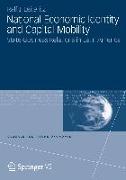- Start
- National Economic Identity and Capital Mobility
National Economic Identity and Capital Mobility
Angebote / Angebote:
Why has capital account liberalization been a durable policy in some countries, but not in others? The book uses the contrast between the path pursued by Peru and Colombia regarding capital account policy during the last twenty years in order to identify two critical factors to account for this puzzle. First, changes in domestic informal institutions – defined as shared collective understandings about legitimate economic policies – are a necessary element of sustainable capital account policy choices. Only if the remains of the previous model of economic development associated with state intervention have been purged from the set of acceptable policies, does capital account openness persist over time. Second, sustainable capital account liberalization presupposes that business-government relations privilege the interests of economic sectors that depend on the unfettered flow of international capital and are largely unaffected by exchange-rate volatility over the interests of exporters worried about exchange-rate appreciation in the context of capital account openness.
Libri-Titel folgt in ca. 2 Arbeitstagen
